The recent heavy storms and floods in eastern Spain have left an apocalyptic scenario behind in many municipalities in the province of Valencia. Hundreds have lost their lives and around 1,900 missing people are still being sought.
The torrential rainfall, hail and strong winds are expected to have caused substantial direct losses to the agricultural sector, mainly to citrus fruits, kakis, vegetables and vines in the regions of La Ribera, Utiel-Requena, L'Horta, Hoya de Buñol, Camp de Túria and La Serranía.
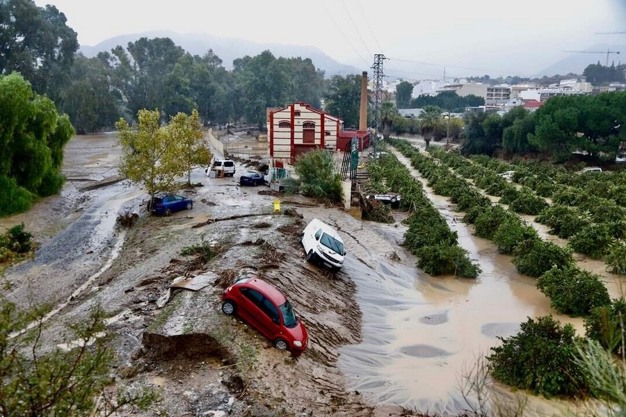
The losses and damage to infrastructure are very severe, with rural roads almost completely washed away, farms completely destroyed by landslides and trees swept away by the violence of the waters. Some packing plants are now unusable, and many hectares of crops are still flooded and inaccessible. A good part of the crops in the flooded fields may be lost and many trees may suffer from root asphyxia due to excessive humidity and die.
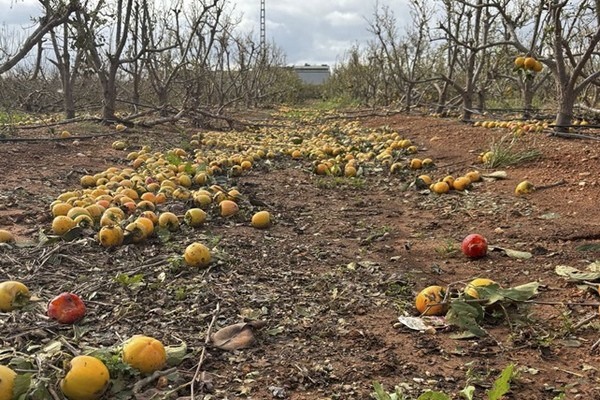
Regarding kakis, pending an evaluation of the total damage, the Spanish Kaki Association expects more than 70% of the production to be lost in many areas, with a lot of fruit fallen from the trees and considerable damage to the plantations. This damage is not only affecting this season's crop, but will likely affect crop yields in the coming years, given that many trees have suffered structural damage that will require time and costly recovery efforts. The Valencian Community is the main kaki exporter, accounting for almost 70% of Spain's total exports.
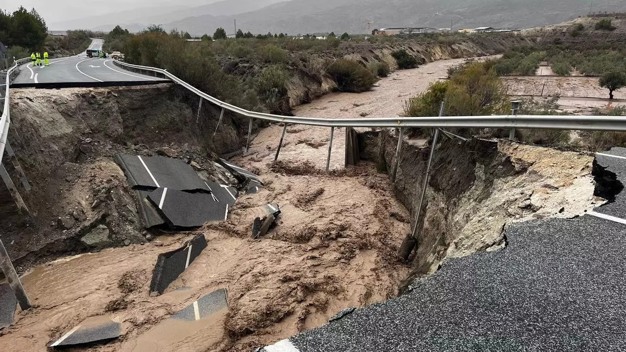
Road landslides. Photo by Europa Press.
According to agricultural organizations, the citrus production has suffered significant damage, especially the early and mid-season varieties, although the mandarins and oranges that were scheduled to be harvested this month will also be affected.
The solidarity of Valencian producers
Although thousands of hectares of crops have been severely damaged, producers are prioritizing work in the towns, removing mud, vehicles and other materials and even rescuing people with tractors, diggers, trailers or by hand.
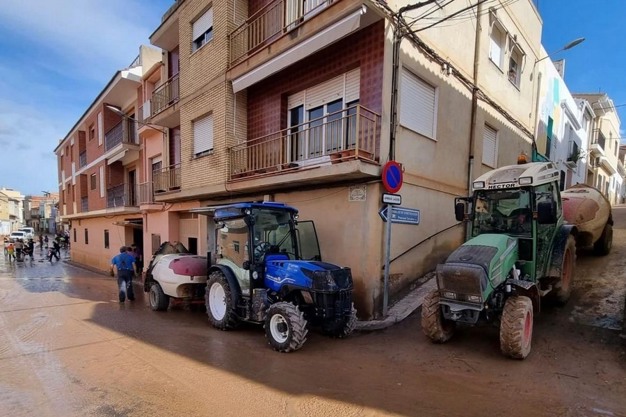
Growers from all Valencian regions, as well as from the provinces of Castellon and Alicante, remain involved in all the work. In some municipalities, agricultural producers, together with neighbors and local businesses, were in fact the first to try helping people trapped in their homes and to partially or totally clean up the town center. A producer from Picanya said: "I still haven't been able to go and see the condition my fields are in; the priority is to fix the homes and streets."
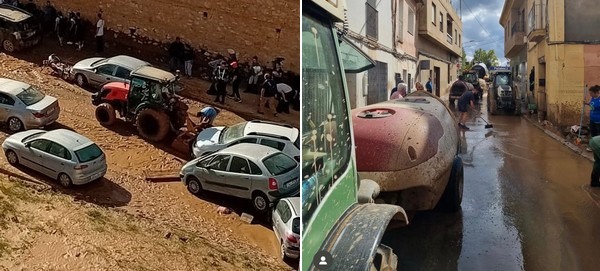
More than 30 kilometer long traffic jams in Valencia
Valencia has started the week with traffic jams on the main accesses to the capital and the metropolitan area, due to the fact that many of the roads are still inaccessible and that the focus of the little infrastructure recovery that has already been undertaken has been on facilitating the work of the emergency teams.
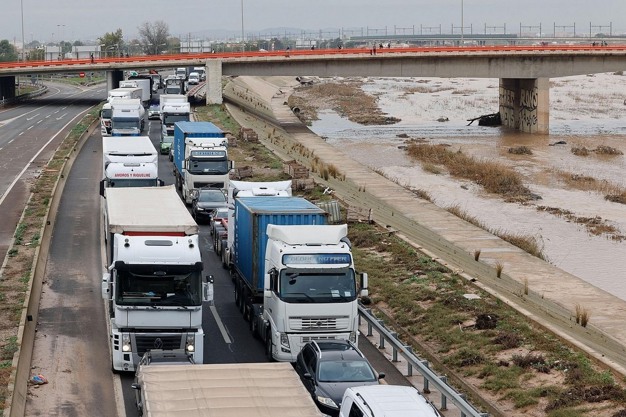 Kilometers of traffic jams in Valencia. Photo by Europa Press.
Kilometers of traffic jams in Valencia. Photo by Europa Press.
The Integrated Operational Coordination Center (CECOPI) of the Government of Valencia agreed last Sunday on a 48 hour extension of the restriction on the circulation of private vehicles on the access roads to the municipalities that have been most severely hit; a measure that has been in force since last Friday night.
Message from the Valencian company Sanifruit, from Chiva
"We are among those affected by the storm and floods which have devastated our town. First of all, we would like to confirm that everyone here at Sanifruit is safe and sound," said brothers Javier and Erica Biel.
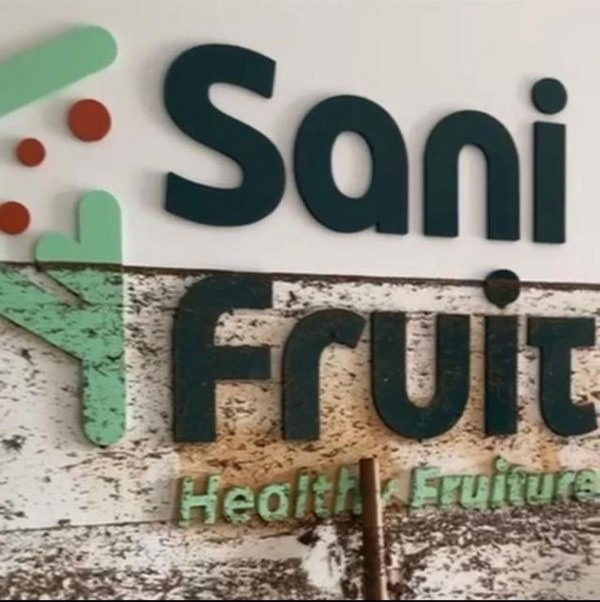
"At Sanifruit, we have suffered material damage that we have tried to alleviate by working together, shovel in hand. We aim to resume our activity as soon as possible so that we can continue providing a service to our clients. As of today, we are once again operational and providing national and international service. Our colleagues are ready to provide the necessary service and attention," they say.
"These are very challenging days, and we need to be strong and work together in order to move forward. Our hearts go out to our neighbors, who have been left with nothing, and to those families who, sadly, have lost their loved ones. Still, we want to send a message of hope. We feel grateful for all the support we have received, your calls, your messages and all the spontaneous help provided to our town. This is giving us the necessary energy and faith to carry on," they say.
In Andalusia, 5,000 hectares have been damaged in Almeria, citrus fruits have been hit in Malaga and strawberries have been spared in Huelva
In Andalusia, greenhouses and vegetable infrastructures have also been damaged in the province of Almeria, where the Andalusian regional Government has estimated the number of damaged hectares at 5,000. In Malaga, citrus fruits have been the most affected, and there has also been a lot of damage to agricultural infrastructure.
Meanwhile, in other provinces such as Jaen, Cordoba, Granada and Huelva, the rains have been rather beneficial.
In Huelva, the rainfall has been considerable in municipalities such as Aljaraque, where almost 150 mm of rain were recorded on November 1, as well as in Cartaya, Gibraleón and Punta Umbría, according to the Huelva Provincial Council. For the strawberry sector, "the benefit of the rains has outweighed the damage they may have caused," says Manuel Alfaro, manager of El Pilonar and Pilón e Hijos.
"Normally, the planting in our fields lasts until around October 20, but this year the nurseries have taken a little longer than usual to deliver the strawberry plants and we have been working in the planting until October 31. As a result, the damage caused by the storm has been more limited than it would have been if the greenhouses had already been mostly covered", explains Alfaro.
Red alert in Catalonia due to storm
In the last few days, rain has also been in the headlines in Catalonia, where flooding has been recorded on some roads in Barcelona and at El Prat airport. Catalonia, and in particular the province of Barcelona, has been hit directly by the storm, leading the authorities to activate red alerts due to the heavy torrential rains recorded.
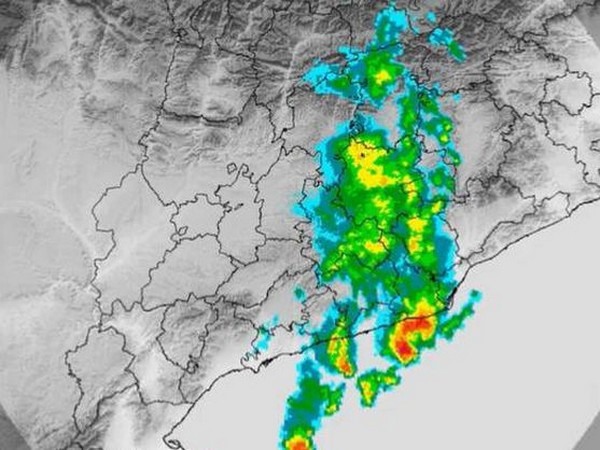
The weather has already caused the flooding of some roads, so the Catalan Government issued warnings for the population to take precautions.










